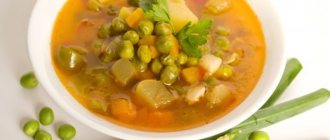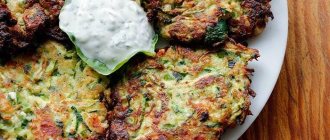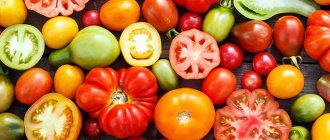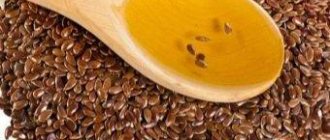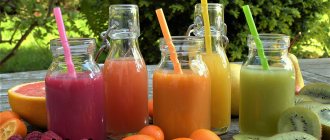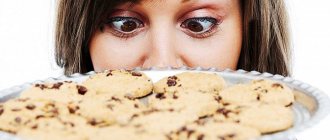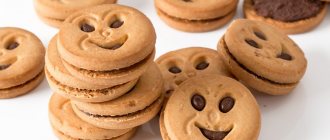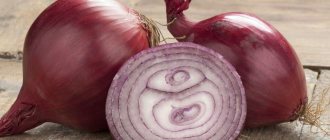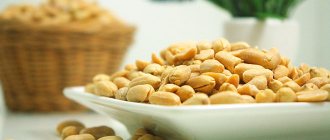It is difficult to find a person who has not tried pumpkin seeds at least once in his life. It's even harder to find those who don't like them. And this is not surprising. Pumpkin seeds are as nutritious and tasty as they are healthy. They can be eaten both raw and fried.
They contain a huge amount of different macro and microelements, vitamins and other components that are urgently needed for the human body. Pumpkin seeds strengthen the immune system, improve mood and, in general, have only a positive effect on overall well-being.
But the period of breastfeeding is a special, responsible time. Mothers need a special diet, but now they have to give up a lot of foods that were so familiar and beloved just recently. And a logical question arises - is it possible to eat pumpkin seeds while breastfeeding?
From this article you will learn:
- Is it possible to eat pumpkin seeds while breastfeeding?
- Beneficial properties of pumpkin seeds during breastfeeding
- Benefits of pumpkin seeds during breastfeeding:
- Contraindications
The benefits of sunflower seeds during lactation
First of all, eating seeds while breastfeeding has a positive effect on milk production. Along with nuts, this type of snack is the highest priority for women who have problems with it.
Selenium contained in sunflower seeds is extremely beneficial not only for a nursing woman, but also for a baby. This microelement helps improve immunity and prevents the development of a number of diseases characteristic of the first years of a child’s life. Selenium also reduces the risk of malignant tumors and improves the functioning of the endocrine system. In addition, the seeds contain fatty acids and fiber, which can significantly reduce cholesterol levels.
In conditions of mental stress, which a woman is often exposed to during breastfeeding, snacking on seeds is a kind of calming procedure. Also, the process of clicking seeds helps to significantly improve mood and improve concentration, which has a positive effect on the general condition of the body.
Substances found in sunflower seeds affect the production of endorphins, which is also characteristic of chocolate. However, frequent consumption of sweets irreversibly leads to weight gain in women. Moderate consumption of sunflower kernels does not have this effect, which is a definite plus.
This product is rich in various vitamins. For example, vitamin E helps strengthen the myocardium. Vitamin A is essential for regulating hormones that affect vision and skin. The seeds also contain vitamins B and D, which have a positive effect on many processes in the body of mother and child. Microelements include iodine, magnesium, iron, zinc, copper and fluorine. These substances have a beneficial effect on the state of the endocrine, immune and cardiovascular systems.
An undoubted advantage of eating seeds is their ability to distract a smoking woman from her addiction. This effect is especially relevant during lactation.
This is due to the fact that nicotine and other harmful substances that enter a woman’s body through smoke have an extremely negative effect on the quality of breast milk and, as a result, on the health of the child. Replacing smoke breaks with snacks with seeds significantly improves the general condition of a woman’s body and allows her to gradually get rid of a bad habit.
In addition, sunflower seeds improve the functioning of the gastrointestinal tract and help increase appetite, which also has a positive effect on lactation.
How not to regret your choice
The huge assortment of pumpkin seeds in the store makes your eyes wide open. Is it possible to buy any? Of course not, because the status of a caring mother obliges you to choose only the best and safest ones when breastfeeding.
- Salt, glaze, honey and other additives are of no use to you: they will not bring any benefit, but they can easily provoke allergies in your baby.
- Among all the variety, opt for regular seeds. The safest ones will be the unpeeled ones: thanks to their shell, they protect the seeds from drying out, microbes and contamination.
- Do not forget to pay attention to the expiration date and integrity of the packaging if you do not buy seeds by weight.
Harm of eating sunflower seeds
Despite the extensive list of positive effects of consuming seeds during lactation, there are a number of negative aspects.
Some substances that make up sunflower seeds are dangerous allergens that can cause various skin reactions in a baby. This is especially true in the first weeks of a child’s life. Thus, it is generally accepted to consider the use of seeds during this period inappropriate.
However, due to the above factors, it is still necessary to introduce this product into the diet. Therefore, it is recommended to do this gradually, starting with a few seeds a day and ending with small handfuls. It should be remembered that any changes in a nursing woman's diet should be discussed with a qualified physician.
In addition to skin rashes, your baby may experience abdominal pain, flatulence, intestinal upset, or constipation. If such reactions occur, use of seeds should be stopped immediately.
The shell of grains often has many pathogenic microorganisms on its surface, especially if the seeds were purchased by weight. In order to avoid the development of a number of undesirable consequences, it is necessary to purchase grains in closed packages.
Due to the high calorie content of sunflower kernels, their excessive consumption entails the risk of weight gain for a nursing woman. In conditions of a natural tendency to be overweight, you should monitor the amount of calories consumed and not exceed the daily norm.
In some cases, the taste of breast milk may change due to certain substances found in sunflower seeds. However, this cannot be clearly attributed to negative effects.
Valuable qualities and disadvantages of different types
Most people believe that there are only sunflower and pumpkin seeds. And only they are consumed, with preference given to sunflower seeds. And we will also look at such representatives as flax and sesame seeds.
Sunflower seeds
Many mothers, and not only others, love this delicacy. What are the pros and cons of this product:
- High levels of fatty acids. Their action prevents the formation of excess cholesterol.
- When consumed raw, it helps improve appetite.
- Helps cope with stress.
- Large vitamin and mineral complex.
- They have a reparative effect.
However:
- Clicking seeds with your teeth has a negative impact on the tooth surface.
- When consuming fried ones, heartburn may occur.
- May contain cadmium in large quantities.
- During the frying process, valuable qualities disappear, in addition, carcinogenic properties are acquired.
- May provoke allergies.
- There is a possibility of changes in the taste of milk.
- If overused, they can cause constipation.
- They contain a large number of calories, so they are contraindicated for overweight people.
Sesame seeds
This product can provide great benefits to your body. And what exactly does it contain:
- High fiber and lecithin content.
- The composition includes the substance phytin, which has an antiviral effect.
- Available sec. Prevents the development of cancer.
- Reduces the likelihood of mastopathy.
- Acts as an aphrodisiac.
However, along with the advantages, there are also disadvantages:
- Increases blood clotting.
- Dangerous for use if there are stones in the excretory system; and also in cases of excess calcium in the body.
Pumpkin seeds
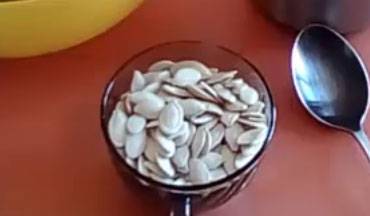
So tasty and lower in calories than sunflower seeds. What is their beneficial effect:
- Helps strengthen the body's immune system.
- Increases the performance of the nervous and cardiovascular systems.
- Improves the digestion process.
- They take an active part in removing excess salt and water from the body.
- They affect breast milk, increasing its fat content.
- Can be used as an anthelmintic.
But even here there is a drawback: if abused, there is a risk of ulcerative pathology.
Flaxseeds
What valuable properties do these seeds have:
- Contain omega-3 fatty acids in large quantities.
- They increase the efficiency of the digestive system, thereby improving the process of digesting food.
- Promote weight loss by normalizing metabolic processes in the body and removing toxins.
What are the disadvantages:
- They have a laxative effect, although not pronounced.
- Contraindicated for women with polycystic disease and uterine fibroids.
https://youtube.com/watch?v=Zbm-_V3M600
Pumpkin seeds during breastfeeding
Provided that a nursing woman is prohibited from consuming sunflower kernels for one reason or another, pumpkin seeds are a life-saving alternative. This is primarily due to the fact that they are absolutely safe and do not cause allergic reactions in the baby.
Pumpkin seeds are rich in microelements and vitamins that help improve the condition of a woman’s skin and hair. Regular consumption of this delicacy in moderate portions helps prevent the appearance of age wrinkles and age spots. It has a beneficial effect on the functioning of the child’s digestive and urinary systems.
Pumpkin seeds are especially relevant during the recovery period after childbirth, as they can boost immunity and improve the tone of a woman’s body.
It is worth noting that the use of pumpkin seeds is often justified in the treatment of helminthic infestations in children. Unlike many medications, the use of pumpkin kernels does not put a strain on the mucous membranes of the gastrointestinal tract, which makes their use a priority. However, if the disease manifests itself, you should not rely only on seeds. Correct therapy for the pathology can only be prescribed by the attending physician.
Recommendations for choosing and consuming pumpkin seeds for a nursing mother
There are a number of tips that will allow you to avoid a lot of negative consequences when consuming pumpkin seeds. Here are the main ones:
- It would be ideal if you buy a whole pumpkin and remove the seeds from it yourself. This way you can be sure that they were not exposed to chemicals in the storage warehouse.
- When purchasing ready-made seeds, make sure that they are not roasted - in such a product the amount of useful substances is reduced to a minimum. It is better to purchase raw seeds, rinse them and dry them a little either in the oven or naturally.
- You should also avoid salted seeds, since excess salt in the body leads to water retention in the body, and, consequently, the formation of edema.
- It is best to clean the seeds with your hands and not with your teeth - this way you will one hundred percent protect yourself and your baby from the ingestion of harmful substances that may remain on the peel.
So, in the course of our article, we came to the conclusion that pumpkin seeds during breastfeeding will be an excellent addition to the menu of a young mother. These seeds have a lot of beneficial properties, and possible side effects are quite rare and are associated mainly with non-compliance with recommendations for use, or with the individual characteristics of the body.
Sesame seeds
When describing the harm and benefits of seeds, one cannot help but recall such a popular product as sesame kernels. Due to their low calorie content, a nursing woman does not have the risk of gaining excess weight, as with the abuse of sunflower grains. Sesame kernels help to significantly strengthen the immune system of both the child and the mother, which is extremely important in conditions of constant overexertion of a woman during lactation. Also, due to the high calcium content in sesame seeds, the child’s musculoskeletal system, hair, teeth and nails are strengthened.
However, a significant disadvantage of sesame kernels in comparison with pumpkin and sunflower seeds is the inability to consume them for a long time. Thus, a certain interest in spending time during the snack period is lost. But despite this, the benefits of consuming sesame seeds are significant.
For preventive purposes, it is recommended to eat a teaspoon of sesame kernels per day.
Sunflower, pumpkin, flax and sesame seeds during breastfeeding
The composition, caloric content and fat content of different types of seeds differs.
Composition and benefits of different types of seeds - table
| Variety of seeds | Compound | Benefit | Calorie content of seeds per 100 g of product (cal) | Fat content per 100 g of product (g) |
| Sunflower seeds |
|
| more than 600 | 51 |
| Pumpkin seeds |
|
| more than 450 | 49 |
| Flax seed |
|
| 500–534 | 45,8 |
| Sesame seeds |
|
| 540–560 | 50 |
Are roasted sunflower seeds good for breastfeeding?
During the frying process, the seeds lose some of their nutrients and vitamins. Therefore, it is better for nursing mothers to consume them raw or slightly dried. If you want roasted seeds, you need to use a small amount of high-quality oil or do without it altogether. Adding salt is not recommended as it may change the taste of breast milk.
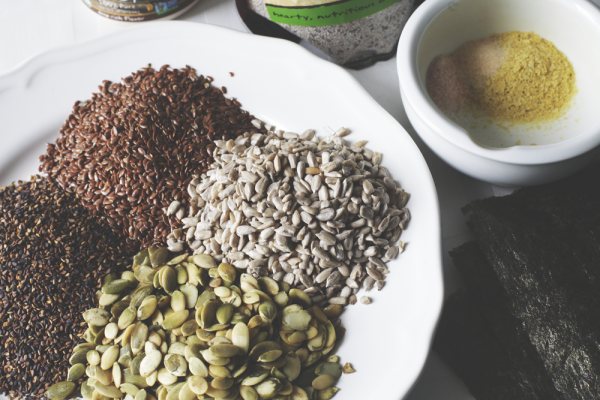
With moderate consumption, the seeds will bring great benefits to the body and appearance of a nursing mother.
Restrictions on use
Since sunflower or pumpkin seeds have a fairly high calorie content, they can significantly burden the gastrointestinal tract. For this reason, it is recommended to consume them in between main meals. They can also be a one-meal replacement for nursing women who are watching their figure and counting the number of calories they receive.
In order for the seeds to have an exclusively therapeutic effect and not create problems for the health of the mother and child, they need to be eaten in moderation. This is especially true if the woman did not consume the seeds before giving birth. In this case, it is necessary to consult with an experienced doctor and then begin to gradually introduce seeds into the main diet.
The initial dose should be determined by a specialist based on the results of the examination of the mother and baby. Often the minimum amount of seeds is 20-30 g per day. In the future, the dose can be increased to 100-150 g of kernels per day, which is sufficient to fully provide the body of a nursing woman and baby with the necessary vitamins and microelements.
For preventive purposes, it is recommended to introduce seeds into a woman’s diet during pregnancy. This is necessary to reduce the likelihood of a number of allergic reactions in the baby during breastfeeding, since the child’s body will be adapted to products of this kind.
In what form can you eat?
Pumpkin seeds during breastfeeding can only be eaten within a safe limit. The beneficial effect on the body becomes noticeable already from 2 tbsp. l. (about 30 g) per day. The maximum amount of pumpkin seeds during breastfeeding per day, called by doctors, is 80 g. The daily use of a healthy natural product is limited for several reasons:
- The calorie content of pumpkin seeds is about 540 kcal per 100 g of purified raw materials. This forces you to dose the product to adjust your weight during breastfeeding.
- Roasted seeds stimulate milk production, but exceeding the daily norm can provoke hyperlactation, leading to stagnation and mastitis.
- To obtain the required amount of certain minerals in pumpkin seeds, it is enough to take 50 g of them per day. An overdose of microelements from plant materials is hardly possible, but women during breastfeeding often take multivitamins, which requires dose adjustment.
Doctors advise taking 60 g of pumpkin seeds per day for no longer than a month. Afterwards, take a break for a week and continue consuming seeds. Also convenient for breastfeeding is the regimen of taking it every other day, then you won’t have to take breaks.
Raw
For the health of a pregnant woman and child, the safest and healthiest way is to independently harvest pumpkin seeds. To do this, just remove the seeds from the vegetable, separate them from the fibers, wash and dry.
Place pumpkin seeds on cloth or gauze. If you need raw seeds, you should not heat them to dry. Purchased seeds must be washed in warm water and dried before use.
Advice! When peeling the peel, do not remove the inner film shell from the seeds. Pumpkin seeds will be even healthier.
Fried
There are several ways to heat-treat pumpkin seeds for use during breastfeeding:
- in a frying pan without oil and salt - 30 minutes;
- in the oven at 180 °C – 20 minutes;
- in the microwave - no more than 5 minutes.
Pumpkin seeds for use during breastfeeding are roasted without seasonings, salt or sweeteners.
Mixture to increase lactation
Preheated seeds are traditionally used to enhance breast milk production. The nuts for the composition can also be slightly calcined.
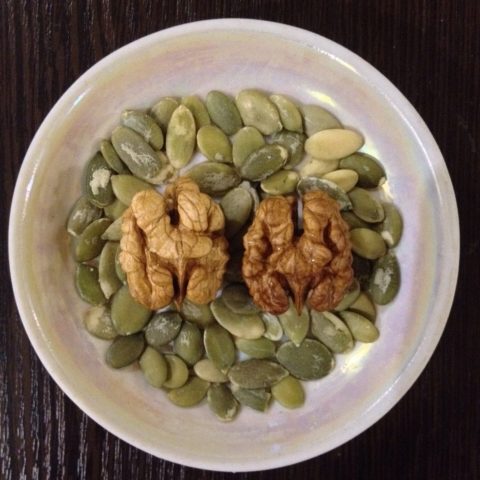
Recipe:
- Seeds and nuts are taken in equal parts and ground to a fine crumb.
- Pour the mixture with boiled milk, cooled to 60 °C.
- The ratio of nut mass to milk is maintained at 1:3.
- Infuse the product for at least 5 hours.
The semi-liquid composition to increase lactation should be taken 1 tbsp. l. three times a day. If there are no contraindications, the recipe can be sweetened to taste.
With honey
After the baby reaches the age of 4 months, a nursing mother can consume a mixture of pumpkin seeds and honey. Raw seeds, freed from the peel, are first ground in a coffee grinder. Mix the product at the rate of 1 tbsp. l. seeds for 2 tbsp. l. honey Store the mixture in the refrigerator and take a tablespoon per day.
Fried or raw
When talking about the significant benefits of eating seeds during breastfeeding, attention is rarely paid to the degree of preparation of the product. And this is a grave mistake. This is primarily due to the fact that when grains are fried, almost all the beneficial substances disappear, which makes consuming them during lactation absolutely useless and even dangerous. The main harm lies in a certain amount of carcinogens contained in roasted seeds.
For this reason, the seeds should be eaten raw or lightly dried in a frying pan. Also, many women find the taste of dried or raw grains softer and more pleasant, which is a significant plus.
What harm could it do?
For all their beneficial properties, pumpkin seeds, when feeding a baby with breast milk, can become harmful to him. How? Judge for yourself.
- They are incredibly high in calories. Due to the huge amount of fat, the calorie content of the product is on average 440 kcal per 100 g. Needless to say, at best, this means a long-term feeling of fullness, and at worst, rapid weight gain.

- They are a potential allergen. Due to the presence of protein, pumpkin seeds consumed while breastfeeding can cause a rash on the skin of babies.
- They are difficult for the body to digest and increase the risk of constipation. The high fat content of the product makes it extremely difficult to digest. In large quantities, pumpkin seeds can cause constipation. True, in this case they need to be eaten at least 1 kg per day.
It is also worth mentioning the dangers of roasted seeds during breastfeeding, because most often it is in this form that they are consumed. But in vain. Lactation consultants and pediatricians agree that any foods that are heated will lose more of their nutrients.
In addition, carcinogens develop in them, turning them from a healthy and useful product into an incredibly harmful one. Thus, try to choose dried seeds.


